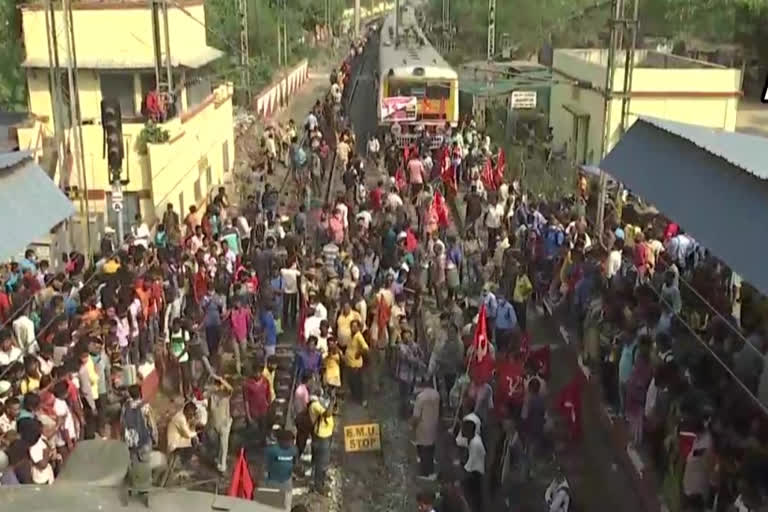New Delhi: Central Trade Unions on Monday began a two-day nationwide strike to protest against the government's alleged wrong policies that are affecting farmers, workers and people. Amarjeet Kaur, General Secretary of All India Trade Union Congress (AITUC), said, "The two-day nationwide strike by the joint forum of central trade unions has begun this morning".
Banking services were partially impacted as a section of bank employees did not report for duty in support of the two-day nationwide general strike called by central trade unions. However, there was hardly any impact on the functioning of new generation private sector banks.
Transactions at many public sector banks have been impacted as employees have not reported for duty. Besides, there might be a delay in cheque clearances and government treasury operation might also be affected by the strike. The impact of the strike is prominent in eastern India as many branches of public sector banks there are closed, All India Bank Employees Association (AIBEA) General Secretary C H Venkatachalam said.
In the other regions, branches are open as officers are present but services are being impacted due to many employees participating in the strike, he said. Bank unions are protesting against the government's move to privatise two public sector banks as announced in Budget 2021-22. They are also demanding an increase in the interest rate on deposits and a reduction in service charges.
Besides AIBEA, the Bank Employees Federation of India (BEFI) and All India Bank Officers' Association (AIBOA) are also part of the two-day strike call given by the joint forum of central trade unions and various sectoral independent trade unions to protest against the government's anti-people economic policies and anti-worker labour policies.
All Indian Trade Union Congress (AITUC), Centre of Indian Trade Unions (CITU) and Indian National Trade Union Congress (INTUC), among others are demanding scrapping of the proposed changes in labour laws and privatisation in any form. Increased allocation of wages under MNREGA (Mahatma Gandhi Rural Employment Guarantee Act) and regularisation of contract workers are also part of their demands.
Most of the banks, including the State Bank of India (SBI), had informed their customers about the proposed strike and the likely impact on the services in advance.
Also read: Bharat Bandh today, tomorrow; banking, transport services may be hit: 10 points
About the impact of the agitation, she said that the entire coal belt (mining area) is affected in Jharkhand, Chhattisgarh and Madhya Pradesh. She also said that there is a good response in industrial areas of Assam, Haryana, Delhi, West Bengal, Telangana, Kerala, Tamil Nadu, Karnataka, Bihar, Punjab, Rajasthan, Goa and Odisha. The AITUC official noted that the banks and insurance sectors are affected all over India, while steel and oil sectors are also seeing partial impact due to the strike.
Kaur said that she has got preliminary reports that markets are closed in Odisha. As many as 10 Central Trade Unions (CTUs) have joined hands to go on a two-day nationwide strike from Monday. About 20 crore workers are expected to join the strike. The strike notices have been given by the unions in various sectors, such as coal, steel, oil, telecom, postal, income tax, copper, banks, and insurance, among others. The unions in railways and defence sector are making mass mobilisation in support of the strike at several hundred spots, the joint forum had said earlier.
In Kerala, the roads wore a deserted look, and only a few private vehicles could be seen. The Kerala State Road Transport Corporation (KSRTC) has halted its services. The police have arranged for a travel facility to help people reach destinations like railway stations, hospitals etc. However, the emergency services have been excluded from the strike. The Kerala High Court has restrained five unions in the Bharat Petroleum Corporation Limited (BPCL) from participating in the strike.
In West Bengal, even though the trade unions could be seen protesting on the streets, the state government has asked all offices to remain open and mandated employees to report for duty. Members from the Left Front gathered in huge numbers and blocked railway tracks at Jadavpur Railway Station in Kolkata, in view of the two-day nationwide strike called by different trade unions.
Other than the Bharatiya Mazdoor Sangh (BMS), almost all other trade unions are participating in the strike. In Parliament, the CPI(M) MP Bikashranjan Bhattacharyya has moved the motion for suspension of business in Rajya Sabha under Rule 267 to discuss the issue of the two-day nationwide strike. Likewise, the CPI MP Binoy Viswam gave a suspension of business notice in Rajya Sabha under rule 267 over the "two-day nationwide strike called by workers across the country to protest against the corporatisation and privatisation policies of the Central Government".
A joint forum of central trade unions had given a call for a nationwide strike on March 28 and 29 to protest against the government policies affecting workers, farmers, and people. Their demands include the scrapping of the labour codes, no privatisation of any form, scrapping of the National Monetisation Pipeline (NMP), increased allocation of wages under MNREGA (Mahatma Gandhi Rural Employment Guarantee Act) and regularisation of contract workers among others.
The central trade unions that are part of this joint forum are INTUC, AITUC, HMS, CITU, AIUTUC, TUCC, SEWA, AICCTU, LPF and UTUC. Taking cognisance of the call, the Ministry of Power on Sunday had issued an advisory to states and other agencies to be on high alert and ensure round the clock electricity supply and stability of the national grid.
With agency Inputs



